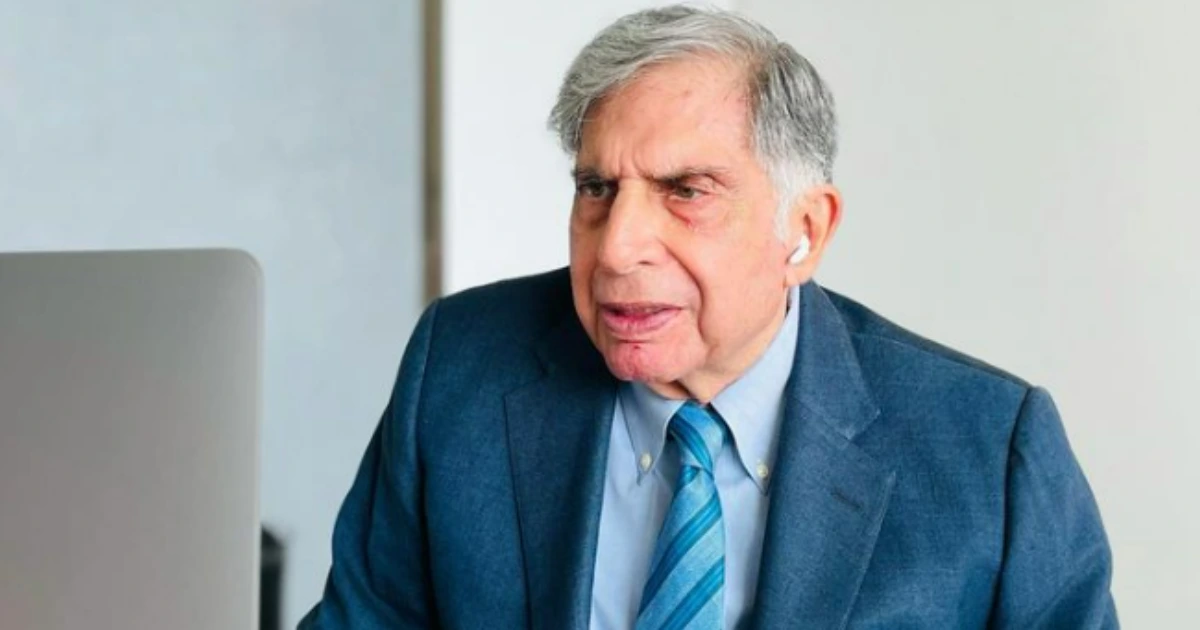RATAN TATA/ image credit- INSTAGARAM
India has lost one of its most respected and visionary business leaders, Ratan Tata, who passed away at the age of 86. The Tata Group announced the news on Wednesday, confirming that Tata had been in intensive care at a Mumbai hospital since Monday. Known for his humility, innovation, and leadership, Ratan Tata’s contributions went far beyond business, deeply influencing India’s economic growth and social development. His passing marks the end of an era for the Tata conglomerate and the nation as a whole.
A Leader Who Shaped the Tata Group and India
Ratan Tata, the former chairman of Tata Sons, led the conglomerate for over 20 years, transforming it into a global powerhouse. Born into the illustrious Tata family, he began his career with the Tata Group in 1962, after completing his education at Cornell University. Working in various Tata companies, including Telco (now Tata Motors) and Tata Steel, he earned respect for his hands-on approach and strong work ethic.
In 1991, Tata took over the reins of the group from his uncle, J.R.D. Tata, at a time when India was opening up its economy to the world. The liberalization of the Indian economy provided a fertile ground for Tata’s vision, and under his leadership, the group expanded into global markets and diversified into various sectors.
Notable among his achievements was the launch of the Tata Nano, which became famous as the world’s most affordable car. Though it faced commercial challenges, it symbolized Tata’s ambition to make cars accessible to the masses. He also spearheaded the expansion of Tata Consultancy Services (TCS), which went on to become a leader in the global IT services sector.
A Humble Giant in Philanthropy and Innovation
Beyond his business acumen, Ratan Tata was a deeply committed philanthropist. He was instrumental in the work of Tata Trusts, one of India’s largest charitable organizations, which contributes to education, healthcare, and rural development. Throughout his career, he was known for his integrity and emphasis on ethical business practices.
Tata’s humble and compassionate nature won him admirers far beyond the corporate world. His leadership was not merely about profits and expansion but about creating a positive impact on society. Prime Minister Narendra Modi paid tribute to him, calling him a “visionary business leader” and a “compassionate soul.”
A Final Farewell to an Extraordinary Life
Ratan Tata had been undergoing routine medical investigations earlier in the week, which he had addressed in a social media post, dismissing speculation about his health. However, his condition worsened, and he was admitted to intensive care at Breach Candy Hospital in Mumbai.
N. Chandrasekaran, the current chairman of Tata Sons, expressed profound grief in a statement, calling Tata an “uncommon leader” who helped shape both the Tata Group and the nation itself. “It is with a profound sense of loss that we bid farewell to Mr. Ratan Naval Tata,” Chandrasekaran said.
Ratan Tata’s Legacy: Leadership, Humility, and Vision
Even after stepping down as chairman of Tata Sons in 2012, Ratan Tata remained an influential figure. He was named chairman emeritus of Tata Sons, Tata Motors, and Tata Steel, and he continued to guide the company during key decisions. In 2016, he returned briefly as interim chairman during a leadership dispute within the group, demonstrating his commitment to the company’s success.
Ratan Tata’s legacy is not only one of business success but also of profound contributions to society. His leadership set a new standard for ethical business practices, and his vision helped transform the Tata Group into a global conglomerate with a presence in over 100 countries.
FAQs About Ratan Tata
Q: Who was Ratan Tata?
A: Ratan Tata was the former chairman of Tata Sons and one of India’s most respected business leaders. He led the Tata Group for over 20 years and was instrumental in transforming it into a global conglomerate.
Q: What were Ratan Tata’s notable achievements?
A: Ratan Tata is credited with launching the Tata Nano, the world’s most affordable car, and expanding Tata Consultancy Services (TCS) into a global IT leader. He also led the group’s acquisitions of international companies like Jaguar Land Rover and Corus Steel.
Q: When did Ratan Tata retire?
A: Ratan Tata retired as chairman of Tata Sons in 2012 but continued to serve as chairman emeritus of several Tata Group companies. He briefly returned as interim chairman in 2016 during a leadership dispute.
Q: What was Ratan Tata’s role in philanthropy?
A: Ratan Tata was deeply involved in Tata Trusts, one of India’s largest charitable organizations. The Trusts focus on initiatives in education, healthcare, rural development, and poverty alleviation.
Q: How did Ratan Tata contribute to Indian society?
A: Beyond his business success, Ratan Tata was known for his ethical leadership and philanthropy. He worked towards making society better through his initiatives in Tata Trusts and maintained a strong focus on social responsibility.
Q: What were some of Ratan Tata’s international ventures?
A: Under Tata’s leadership, the group acquired Jaguar Land Rover in 2008 and Corus Steel in 2007, which helped the conglomerate expand its global footprint.
Q: What did Prime Minister Narendra Modi say about Ratan Tata?
A: Prime Minister Narendra Modi paid tribute to Ratan Tata, calling him a visionary business leader, a compassionate soul, and an extraordinary human being. He praised Tata for his humility, kindness, and commitment to societal betterment.
Ratan Tata leaves behind a legacy that extends beyond the boardroom, touching the lives of millions of people through his visionary leadership and deep sense of responsibility towards society. His passing is a monumental loss for India and the world, but his legacy will continue to inspire generations to come.
